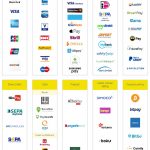Email marketing remains one of the most effective tools for businesses to engage with their audience, drive conversions, and build relationships. With a plethora of email marketing platforms available, it can be overwhelming to choose the right one that fits your business needs and helps improve engagement with your subscribers. In this article, we will compare popular email marketing platforms to help you make an informed decision for better engagement:
1. Mailchimp
- Key Features: Mailchimp is known for its user-friendly interface, intuitive drag-and-drop editor, automation tools, and robust analytics.
- Pros: Offers a free plan for beginners, easy to use for creating visually appealing emails, provides detailed reporting and A/B testing.
- Cons: Pricing can become expensive as your subscriber list grows, limited segmentation options on the free plan.
2. Constant Contact
- Key Features: Constant Contact offers customizable templates, list segmentation, social media integration, and event management tools.
- Pros: Great customer support, easy to use even for beginners, strong deliverability rates, and built-in e-commerce tools.
- Cons: The pricing can be higher compared to other platforms, limited automation capabilities.
3. ConvertKit
- Key Features: ConvertKit is well-suited for bloggers, content creators, and online marketers with advanced automation features, tagging, and segmentation.
- Pros: Focuses on simplifying automation workflows, easy to segment subscribers based on behavior, offers customizable forms and landing pages.
- Cons: Not as visually appealing as other platforms, limited template options, can be challenging for beginners.
4. GetResponse
- Key Features: GetResponse offers a wide range of features including email marketing, webinar hosting, landing pages, and marketing automation.
- Pros: All-in-one platform for marketing needs, high deliverability rates, built-in webinar capabilities, and advanced segmentation options.
- Cons: Interface can be overwhelming for beginners, pricing plans can get expensive with additional features.
5. AWeber
- Key Features: AWeber is known for its reliable email deliverability, autoresponder functionality, email automation, and extensive template library.
- Pros: User-friendly interface, excellent customer support, robust split testing options, and integration with popular e-commerce platforms.
- Cons: Limited customization options for templates, pricing can be higher compared to some competitors.
When comparing email marketing platforms for better engagement, it’s important to consider factors such as ease of use, pricing, automation capabilities, reporting features, customization options, and customer support. Ultimately, the best platform for your business will depend on your specific needs, goals, and budget. Take advantage of free trials or demos to test different platforms and see which one aligns best with your email marketing strategy and objectives.
By choosing the right email marketing platform that caters to your business requirements and enhances engagement with your audience, you can effectively leverage the power of email marketing to drive results, nurture relationships with your subscribers, and achieve your marketing goals successfully.









